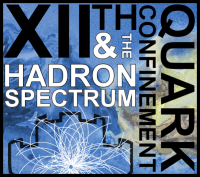Speaker
Description
The concept of Generalized Parton Distributions promises an understanding of the generation of the charge, spin, and energy-momentum structure of hadrons by their fundamental constituents, quarks and gluons. Forthcoming measurements with unprecedented accuracy at Jefferson Lab and at CERN will presumably challenge our quantitative description of the three-dimensional structure of hadrons. To fully exploit these future experimental data, new tools and models are currently being developed.
We will explain the difficulties of Generalized Parton Distribution modeling, and present some recent progresses. In particular we will describe the symmetry-preserving Dyson-Schwinger and Bethe-Salpeter framework. We will also discuss various equivalent parameterizations and sketch how to combine them to obtain models satisfying a priori all required theoretical constraints. We will explain why these developments naturally fit in a versatile software platform, named PARTONS, dedicated to the phenomenology of GPDs.
